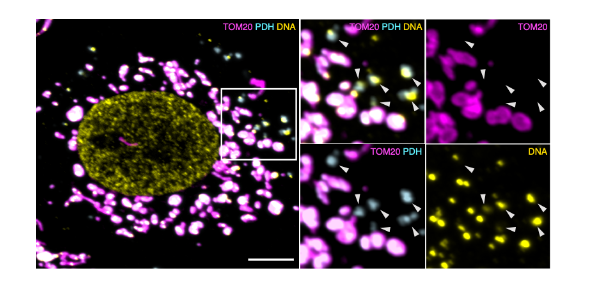
Submitted by Penny Peck on Wed, 08/03/2023 - 16:51
Every cell in the body contains a small organelle, called mitochondrion, that houses thousands of biochemical reactions essential for life. These reactions provide energy for cells through the breakdown of sugar and fat, also generating the building blocks to make protein and DNA. Each cell has hundreds of individual mitochondria that are dynamic compartments moving throughout the cell, fusing together, dividing, and interacting with other organelles to ensure cellular functions. In addition, they also contain their own genetic material, known as mitochondrial DNA (mtDNA) encoding proteins that are vital for the cell.
Hereditary leiomyomatosis and renal cell cancer (HLRCC) is a rare inherited disorder that is caused by a mutation in the Fumarate hydratase (FH) gene, coding for an enzyme of the Krebs cycle, an essential pathway for cellular metabolism. The loss of FH causes the accumulation of a metabolite, fumarate, which is known to contribute to cancerous transformation (oncometabolite) and is associated to a high risk of developing an aggressive form of kidney cancer.
The research group of Dr. Julien Prudent at the Mitochondrial Biology Unit (University of Cambridge, Cambridge) in collaboration with Pr. Christian Frezza at the CECAD (University of Cologne, Germany) have developed novel mouse and cellular models recapitulating the disease in humans and shed new light on how fumarate controls mitochondrial physiology and innate immunity.
The researchers have shown that fumarate causes damage to the mitochondria, which in turn remodel their membranes to release their DNA in small vesicles, known as mitochondria-derived vesicles (MDVs), triggering an innate immune response and inflammation in the kidney.
This work reveals for the first time a connection between a mitochondrial metabolite and inflammation, which could be at the basis of cancer and in several autoimmune diseases. It also highlights the exciting discovery of a novel mechanism allowing mitochondria to export their nucleic acids in the cytosol in a regulated manner, opening new avenues not only to explore mtDNA trafficking within the cell and beyond, but also to develop novel therapeutic strategies.
This study, "Fumarate induces vesicular release of mtDNA to drive innate immunity” has been published in the journal Nature.
Publication reference:
Zecchini, V., Paupe, V., Herranz-Montoya, I. et al.
Fumarate induces vesicular release of mtDNA to drive innate immunity. Nature (2023).
https://doi.org/10.1038/s41586-023-05770-w

